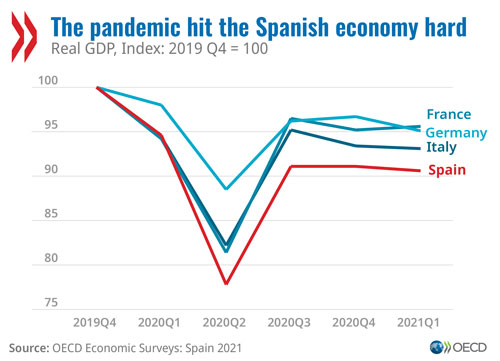27/05/2021 - Spain's economy is on the road to recovery, but the shock from COVID-19 has underlined the urgency of addressing long-standing structural challenges. While support continues to flow to the hardest-hit firms and households, investment and reforms should focus on driving productivity growth and the creation of high-quality jobs, according to a new OECD report.
The latest OECD Economic Survey of Spain says the EU recovery funds, with a focus on green and digital investment, can be key to building a durable recovery and a resilient, more inclusive economy. The plan Spain has drawn up for its allocation of EU funds outlines reforms in areas recommended by the OECD in past Surveys, including education, innovation and competition policies. Prioritising investments and reforms that facilitate long-term growth will ensure the most effective use of the EU funds. A robust governance system, good coordination across levels of government and ensuring transparent criteria and procedures for investment will be key to striking a balance between fast results and accountability.
The Survey, presented by OECD Secretary-General Angel Gurría at a virtual launch event with Nadia Calviño, Spain's Second Vice President and Minister of Economic Affairs and Digital Transformation, projects a rebound in growth to 5.9% this year and 6.3% in 2022, after a 10.8% drop in 2020, supported by pent-up demand and the gradual return of tourism, as well as the boost from the EU recovery funds. Substantial risks surround the outlook. While domestic demand could be stronger than expected with a faster pace of vaccination and use of EU funds, a potential increase in insolvencies once policy support is phased out poses a downward risk.
"Spain has turned a corner after the blow from COVID-19 and there is light at the end of the tunnel. Yet the scars from the pandemic will take time to heal and it is vital to seize this opportunity to invest wisely and pursue ambitious and well-designed reforms," Mr Gurría said. "The recovery plan has the potential to be a 'game changer' for Spain in setting its recovery on a strong, sustainable and inclusive path."
 Prior to the pandemic, Spain was enjoying a robust and job-rich recovery, having improved its economic resilience after the 2008 global financial crisis with a more balanced growth pattern and a healthier financial sector. The impact of the COVID-19 pandemic has been more severe than in other OECD countries due in part to the high share of services and tourism in the economy. Tourism activity dropped by an estimated 75% from April 2020 to March 2021, and some service activities were hit hard by contact restrictions, either due to their nature or because of low take-up of digital technologies.
Prior to the pandemic, Spain was enjoying a robust and job-rich recovery, having improved its economic resilience after the 2008 global financial crisis with a more balanced growth pattern and a healthier financial sector. The impact of the COVID-19 pandemic has been more severe than in other OECD countries due in part to the high share of services and tourism in the economy. Tourism activity dropped by an estimated 75% from April 2020 to March 2021, and some service activities were hit hard by contact restrictions, either due to their nature or because of low take-up of digital technologies.
The crisis has accentuated broad structural challenges in Spain such as persistent unemployment - particularly among youths, a high share of workers on temporary contracts, and barriers to business growth and low productivity growth. The pandemic has also illustrated the benefits of a digitalised economy as countries with higher digital adoption were better positioned to use e-commerce and teleworking to reduce the impact of confinement measures.
The Survey recommends fostering productivity growth with measures to accelerate the digital transformation, boost innovation and create high-quality jobs, through a combination of better skills, support for job seekers and lowering the share of temporary contracts. Reducing barriers to technology adoption and use, including by improving sparse access to high-speed internet in rural areas, should also build resilience by helping firms and workers to adapt to a post-pandemic world.
The Survey notes that the crisis had an uneven effect on regions, which could exacerbate already high regional disparities in income levels, education and employment. To help ensure the recovery benefits as many people as possible, unemployed workers and those on short-time work schemes should be offered high quality and relevant job training, including in digital skills, and individualised job search assistance. Keeping a flexible labour market will help firms to adapt to changing economic conditions, while speedy restructuring of viable firms in temporary distress can speed up the recovery.
Even prior to the COVID-19 crisis, Spain's public finances faced pressure over the long term from an elevated public debt and a ratio of workers to retirees that is projected to be one of the highest in the OECD by 2050. Once the recovery is firmly underway, efforts should be made to lower the debt to GDP ratio, including through a credible and transparent fiscal consolidation strategy involving every level of government. Adequate and socially acceptable measures to ensure the long-term fiscal sustainability of the pension system will also be important.
See a Survey Overview with key findings and charts (this link can be used in media articles)






